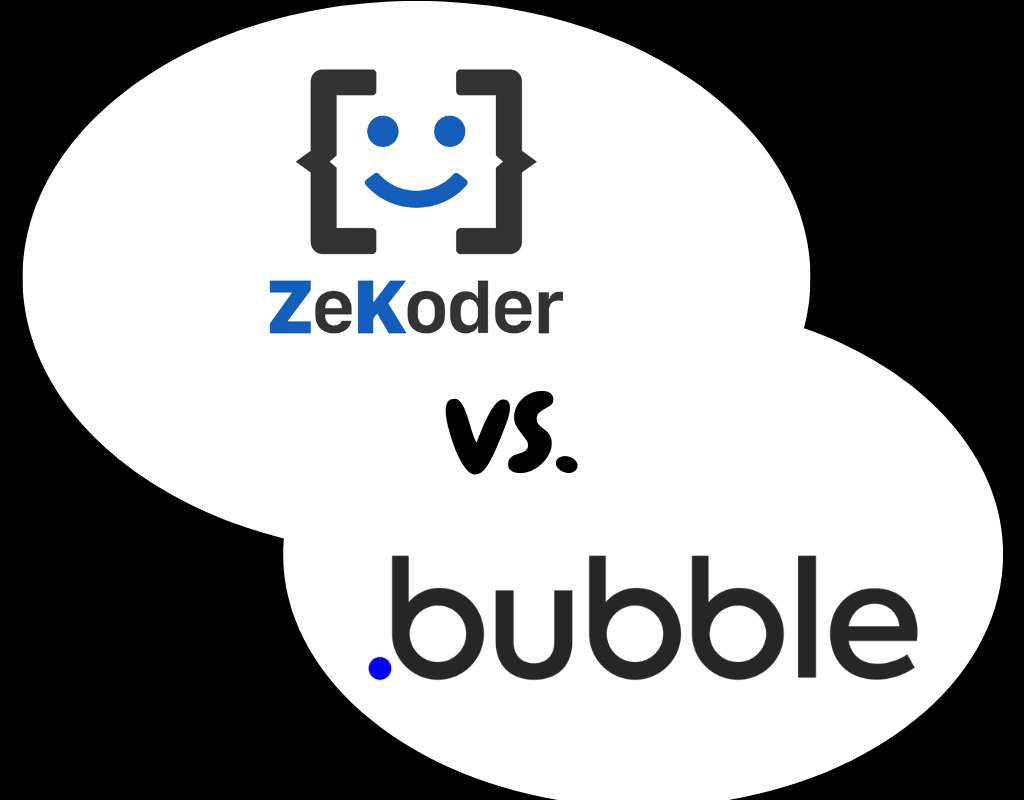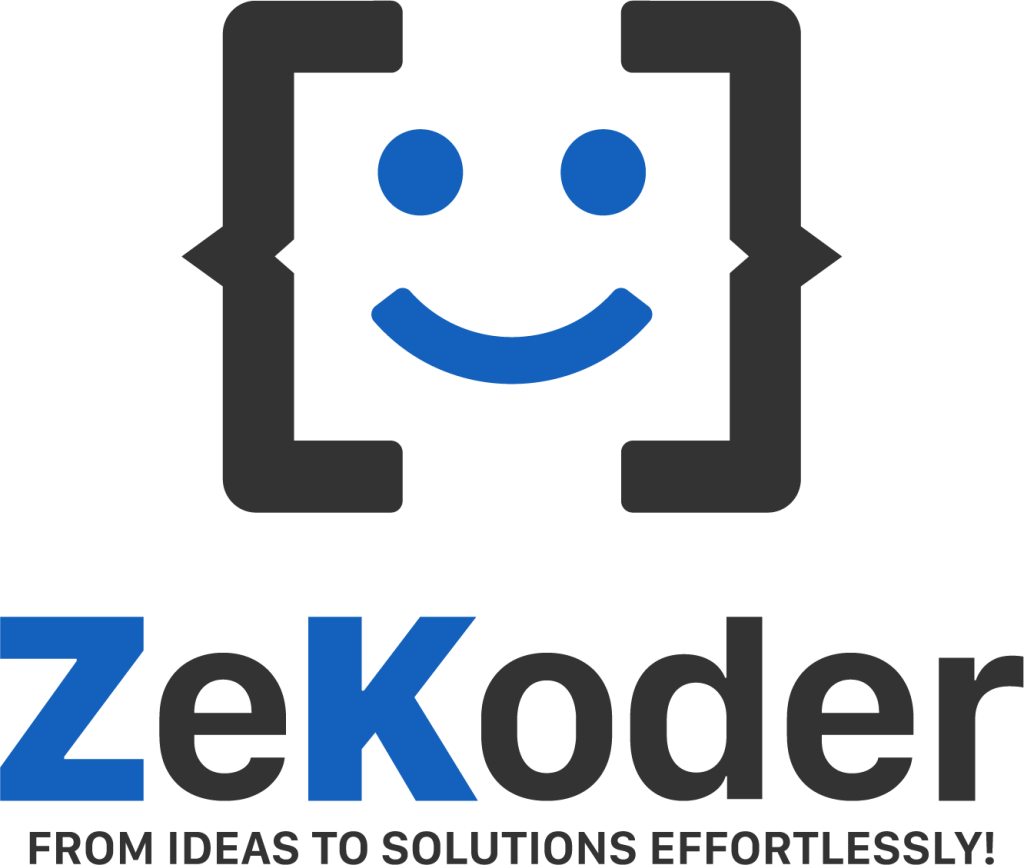ZeKoder vs. Bubble.io: Breaking Free from Vendor Lock-in

In the no-code and low-code development space, two platforms stand out: ZeKoder and Bubble.io. While both empower users to create applications without extensive coding, their philosophies, scalability, and vendor lock-in policies set them apart. In this post, we’ll explore how ZeKoder and Bubble.io compare, with a strong focus on vendor lock-in and ZeKoder’s ability to leverage standard scalable technologies.
Understanding Vendor Lock-in: Why It Matters
Vendor lock-in occurs when a platform restricts users from exporting or migrating their applications, making it difficult to transition to another service. Consequently, this can result in long-term dependency, increased costs, and limited scalability.
ZeKoder: No Lock-in, Total Control
Unlike many platforms, ZeKoder is designed to give users full control over their applications, ensuring:
- Complete code exportability: Users can download and deploy their applications anywhere.
- Support for open-source technologies: Because ZeKoder does not rely on proprietary frameworks, users enjoy full portability across cloud providers.
- Flexible hosting: Applications can be deployed on any cloud provider (AWS, Azure, Google Cloud, DigitalOcean) or even on-premises.
Bubble.io: A Walled Garden
On the other hand, Bubble.io operates within its proprietary environment:
- Code cannot be exported or migrated: Applications built on Bubble.io remain tied to the platform.
- Limited hosting options: Apps must be hosted within Bubble’s ecosystem, primarily relying on AWS.
- Plugin reliance: Many integrations depend on third-party plugins that work exclusively within Bubble.io, significantly limiting flexibility.
If long-term portability and control over your application are important to you, ZeKoder is the superior choice.
Scalability: Standard Technologies vs. Platform Constraints
Scalability is crucial for applications that anticipate growth, whether in user base, data volume, or computational demands. While both platforms provide scalability, their approaches differ significantly.
ZeKoder: Built on Scalable, Industry-Standard Technologies
ZeKoder enables robust scalability using battle-tested open-source tools, including:
- Kubernetes for container orchestration and auto-scaling.
- PostgreSQL for high-performance database management.
- Redis for caching to optimize speed and responsiveness.
- Docker for portable, containerized applications.
As a result, these technologies ensure that ZeKoder applications can scale efficiently across cloud environments without performance degradation.
Bubble.io: Scalability with Limitations
Conversely, Bubble.io’s applications run on AWS, but users face several constraints:
- Scaling is automatic but limited: High-traffic applications may require expensive upgrades.
- Database performance issues: Bubble.io’s default database configuration may struggle with large-scale applications.
- No multi-cloud deployment: Unlike ZeKoder, which allows deployment on any provider, Bubble.io ties you to its infrastructure.
For businesses expecting rapid growth, ZeKoder’s ability to leverage standard, scalable technologies provides a more future-proof solution.
Customization and Flexibility: A Key Differentiator
Customization is vital for businesses that need unique functionalities beyond standard templates and drag-and-drop builders.
ZeKoder: Unlimited Customization with Standard Coding
Unlike Bubble.io, ZeKoder combines AI-powered automation with developer freedom, ensuring:
- Users can integrate custom code in any language (Python, Java, JavaScript, Go, etc.).
- The AI assists with backend logic and database modeling while still allowing full customization.
- ZeKoder-generated code is fully open-source, meaning you can extend or modify it as needed.
Bubble.io: Limited Custom Code Support
Meanwhile, Bubble.io allows some customization, but with restrictions:
- Supports custom JavaScript, HTML, and CSS, but not full-stack modifications.
- Relies heavily on visual workflows, which limits backend flexibility.
- Custom integrations depend on Bubble’s plugin system, restricting external API connections compared to traditional software architectures.
If full-stack control and deep customization are priorities, ZeKoder provides significantly more flexibility.
Deployment Options: Cloud Freedom vs. Platform Dependence
Where and how you deploy your application affects cost, performance, and compliance. Therefore, it’s essential to consider your platform’s deployment flexibility.
ZeKoder: Deploy Anywhere
With ZeKoder, users benefit from:
- Cloud-agnostic deployment: Applications can be hosted on AWS, Azure, Google Cloud, or private servers.
- On-premise capability: Ideal for businesses requiring data sovereignty and compliance.
- Hybrid cloud support: Businesses can mix and match deployment strategies.
Bubble.io: Limited Deployment Flexibility
By contrast, Bubble.io has several restrictions:
- Apps are hosted within Bubble’s infrastructure, offering little flexibility.
- No standalone deployments: Users cannot self-host their applications.
- Migration to another environment is not possible, further enforcing vendor lock-in.
For enterprises and developers needing deployment flexibility, ZeKoder is the clear winner.
Cost Considerations: Avoiding Proprietary Expenses
ZeKoder: Pay for What You Use
ZeKoder ensures cost efficiency by:
- Eliminating licensing fees: Open-source technology avoids vendor-imposed costs.
- Offering scalable pricing: Costs depend on actual cloud usage, allowing optimization.
- Preventing hidden charges: Users control where and how they deploy, reducing unexpected expenses.
Bubble.io: Subscription-Based Costs
On the other hand, Bubble.io follows a subscription-based model, which can become costly:
- Tied to Bubble’s pricing tiers: Advanced features require higher-tier subscriptions.
- Extra charges for scaling: Auto-scaling costs can quickly add up.
- Locked into Bubble’s infrastructure: Users must continue paying to keep their applications running.
For long-term cost efficiency, ZeKoder provides greater flexibility and control.
Final Verdict: Why ZeKoder is the Future-Proof Choice
| Feature | ZeKoder | Bubble.io |
|---|---|---|
| Vendor Lock-in | ❌ No | ✅ Yes |
| Scalability | ✅ High (Kubernetes, PostgreSQL) | ⚠️ Limited (AWS-bound) |
| Customization | ✅ Full (Custom code, AI automation) | ⚠️ Limited (JavaScript, plugins) |
| Deployment Options | ✅ Any cloud, on-prem, hybrid | ⚠️ Bubble-hosted only |
| Cost Efficiency | ✅ Pay for actual usage | ⚠️ Subscription-based with scaling fees |
Choose ZeKoder If You Need:
✔ No vendor lock-in and full application portability
✔ Scalable, industry-standard technologies like Kubernetes and PostgreSQL
✔ Multi-cloud and on-premise deployment options
✔ Full customization with AI-generated components and custom code integration
✔ Cost-efficient development without proprietary licensing fees
Choose Bubble.io If You Need:
✔ A simple drag-and-drop builder for web apps
✔ Quick prototyping with built-in workflows and templates
✔ Seamless third-party integrations via plugins
✔ Hosting on a managed AWS infrastructure
For businesses and developers seeking true flexibility, scalability, and cost-effective deployment, ZeKoder is the superior choice. By avoiding vendor lock-in and leveraging industry-standard technologies, ZeKoder provides a future-proof solution for modern software development.

